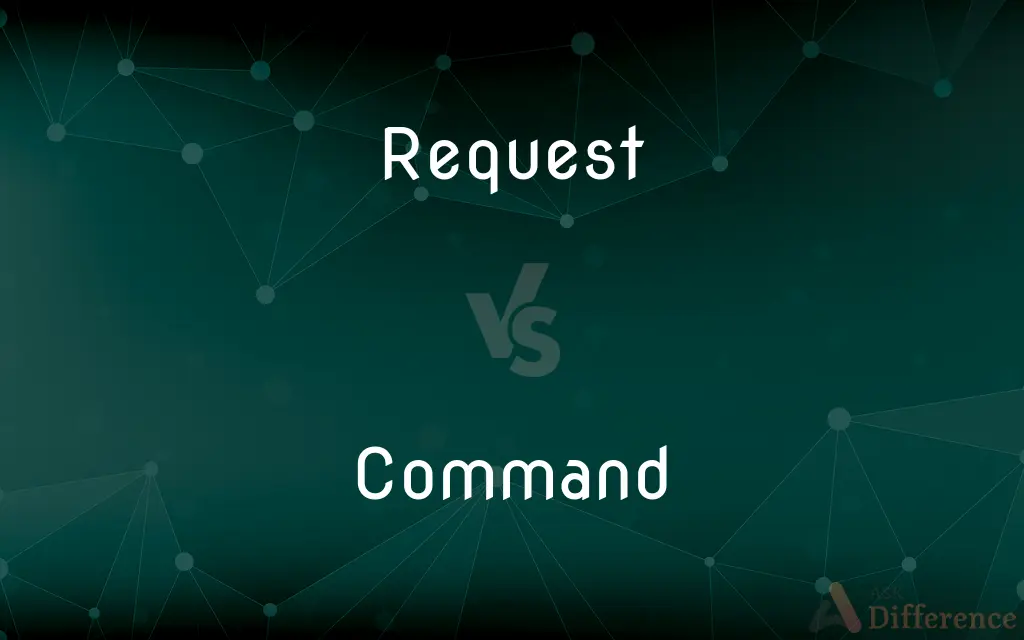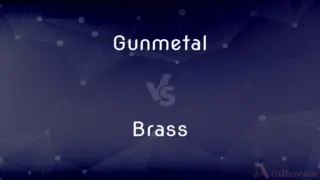Request vs. Command — What's the Difference?
By Tayyaba Rehman — Updated on October 20, 2023
A request seeks permission or favors, typically with politeness. A command directs or orders with authority. Both convey desires but vary in assertiveness and tone.

Difference Between Request and Command
Table of Contents
ADVERTISEMENT
Key Differences
A request is a polite or formal way of asking someone to do something or give something. It often implies that the person has a choice in the matter. Command, on the other hand, implies an authoritative order where compliance is expected without question.
In social interactions, making a request is seen as considerate, allowing the other party the freedom to decline. Using a command can be viewed as assertive or even aggressive, often expecting immediate obedience without debate.
When thinking of language structure, a request often utilizes modal verbs such as "could," "would," or "may." Command typically employs the imperative form of a verb, which gives a direct order.
In software and computing, both terms have distinct meanings. A request often pertains to seeking data or a response, such as in HTTP requests on the web. A command, in contrast, is an instruction given to a computer to execute a specific task.
Comparison Chart
Tone
Polite or formal
Authoritative or assertive
ADVERTISEMENT
Freedom for Recipient
Gives recipient choice or option
Expects compliance without question
Language Structure
Uses modal verbs like "could," "would," or "may"
Uses the imperative form of verbs
Usage in Computing
Seeks data or a response, e.g., HTTP request
An instruction for execution, e.g., command in a command prompt
Typical Response Expected
Agreement, denial, or an alternative
Immediate obedience
Compare with Definitions
Request
A thing that is asked for.
His request was granted immediately.
Command
The ability to use or control something.
He has a good command of the English language.
Request
A solicitation or entreaty to someone.
Her last request was to see the ocean one more time.
Command
Give an authoritative or peremptory order
‘Stop arguing!’ he commanded
My mother commands my presence
He commanded that work should cease
A gruff voice commanded us to enter
Request
A polite or formal petition for something.
She sent a request for more information about the program.
Command
Dominate (a strategic position) from a superior height
The fortress commands the shortest Channel crossing
Request
An act of asking politely or formally for something
A request for information
The club's excursion was postponed at the request of some of the members
Command
Be in a strong enough position to have or secure
They command a majority in Parliament
He commanded considerable personal loyalty
Request
Politely or formally ask for
The chairman requested that the reports be considered
He received the information he had requested
Command
An authoritative order
He obeyed her commands without question
Request
To express a desire for, especially politely; ask for. Often used with an infinitive or clause
Requested information about the experiment.
Requested to see the evidence firsthand.
Requested that the bus driver stop at the next corner.
Command
The ability to use or control something
He had a brilliant command of English
Request
To ask (a person) to do something
The police requested her to accompany them.
Command
An instruction or signal causing a computer to perform one of its basic functions.
Request
An act of asking for something.
Command
To direct with authority; give orders to.
Request
Something asked for
Wasn't happy until he got his request.
Command
To have control or authority over; rule
A general who commands an army.
Request
To ask for (something).
The corporal requested reinforcements.
I have requested that the furniture be moved back to its original position.
Command
To have at one's disposal
A person who commands seven languages.
Request
(transitive) To ask (somebody) to do something.
She called me into her office and requested me to sit down.
Command
To deserve and receive as due; exact
The troops' bravery commanded respect.
Request
Act of requesting (with the adposition at in the presence of possessives, and on in their absence).
Command
To exercise dominating, authoritative influence over
"He commands any room he enters" (Stephen Schiff).
Request
A formal message requesting something.
Command
To dominate by physical position; overlook
A mountain commanding the valley below.
Request
Condition of being sought after.
Command
To give orders.
Request
(networking) A message sent over a network to a server.
The server returned a 404 error to the HTTP request.
Command
To exercise authority or control as or as if one is a commander.
Request
(obsolete) That which is asked for or requested.
Command
The act of commanding.
Request
The act of asking for anything desired; expression of desire or demand; solicitation; prayer; petition; entreaty.
I will marry her, sir, at your request.
Command
An order given with authority.
Request
That which is asked for or requested.
I will both hear and grant you your requests.
Command
(Computers) A signal that initiates an operation defined by an instruction.
Request
A state of being desired or held in such estimation as to be sought after or asked for; demand.
Knowledge and fame were in as great request as wealth among us now.
Command
The authority to command
An admiral in command.
Request
To ask for (something); to express desire ffor; to solicit; as, to request his presence, or a favor.
Command
Possession and exercise of the authority to command
Command of the seas.
Request
To address with a request; to ask.
I request youTo give my poor host freedom.
Command
Ability to control or use; mastery
Command of four languages.
Request
A formal message requesting something that is submitted to an authority
Command
Dominance by location; extent of view.
Request
The verbal act of requesting
Command
The jurisdiction of a commander.
Request
Express the need or desire for; ask for;
She requested an extra bed in her room
She called for room service
Command
A military unit, post, district, or region under the control of one officer.
Request
Ask (a person) to do something;
She asked him to be here at noon
I requested that she type the entire manuscript
Command
A unit of the US Air Force that is larger than an air force.
Request
Inquire for (information);
I requested information from the secretary
Command
Of, relating to, or constituting a command
Command headquarters.
A command decision.
Request
An act of asking politely or formally for something.
He made a request to leave early from work.
Command
Done or performed in response to a command
A command performance.
Request
An application for a transaction or information in computing.
The server processes multiple requests simultaneously.
Command
An order to do something.
I was given a command to cease shooting.
Command
The right or authority to order, control or dispose of; the right to be obeyed or to compel obedience.
To have command of an army
Command
Power of control, direction or disposal; mastery.
He had command of the situation
England has long held command of the sea
A good command of language
Command
A position of chief authority; a position involving the right or power to order or control.
General Smith was placed in command.
Command
The act of commanding; exercise or authority of influence.
Command
(military) A body or troops, or any naval or military force, under the control of a particular officer; by extension, any object or body in someone's charge.
Command
Dominating situation; range or control or oversight; extent of view or outlook.
Command
(computing) A directive to a computer program acting as an interpreter of some kind, in order to perform a specific task.
Command
(baseball) The degree of control a pitcher has over his pitches.
He's got good command tonight.
Command
A command performance.
Command
(ambitransitive) To order, give orders; to compel or direct with authority.
The soldier was commanded to cease firing.
The king commanded his servant to bring him dinner.
Command
(ambitransitive) To have or exercise supreme power, control or authority over, especially military; to have under direction or control.
To command an army or a ship
Command
(transitive) To require with authority; to demand, order, enjoin.
He commanded silence
Command
(transitive) to dominate through ability, resources, position etc.; to overlook.
Bridges commanded by a fortified house. (Motley.)
Command
(transitive) To exact, compel or secure by influence; to deserve, claim.
A good magistrate commands the respect and affections of the people.
Justice commands the respect and affections of the people.
The best goods command the best price.
This job commands a salary of £30,000.
Command
(transitive) To hold, to control the use of.
The fort commanded the bay.
Command
To have a view, as from a superior position.
Command
(obsolete) To direct to come; to bestow.
Command
To order with authority; to lay injunction upon; to direct; to bid; to charge.
We are commanded to forgive our enemies, but you never read that we are commanded to forgive our friends.
Go to your mistress:Say, I command her come to me.
Command
To exercise direct authority over; to have control of; to have at one's disposal; to lead.
Monmouth commanded the English auxiliaries.
Such aid as I can spare you shall command.
Command
To have within a sphere of control, influence, access, or vision; to dominate by position; to guard; to overlook.
Bridges commanded by a fortified house.
Up to the eastern tower,Whose height commands as subject all the vale.
One side commands a view of the finest garden.
Command
To have power or influence of the nature of authority over; to obtain as if by ordering; to receive as a due; to challenge; to claim; as, justice commands the respect and affections of the people; the best goods command the best price.
'Tis not in mortals to command success.
Command
To direct to come; to bestow.
I will command my blessing upon you.
Command
To have or to exercise direct authority; to govern; to sway; to influence; to give an order or orders.
And reigned, commanding in his monarchy.
For the king had so commanded concerning [Haman].
Command
To have a view, as from a superior position.
Far and wide his eye commands.
Command
An authoritative order requiring obedience; a mandate; an injunction.
Awaiting what command their mighty chiefHad to impose.
Command
The possession or exercise of authority.
Command and force may often create, but can never cure, an aversion.
Command
Authority; power or right of control; leadership; as, the forces under his command.
Command
Power to dominate, command, or overlook by means of position; scope of vision; survey.
The steepy standWhich overlooks the vale with wide command.
Command
Control; power over something; sway; influence; as, to have command over one's temper or voice; the fort has command of the bridge.
He assumed an absolute command over his readers.
Command
A body of troops, or any naval or military force or post, or the whole territory under the authority or control of a particular officer.
Command
An authoritative direction or instruction to do something
Command
A military unit or region under the control of a single officer
Command
The power or authority to command;
An admiral in command
Command
Availability for use;
The materials at the command of the potters grew
Command
A position of highest authority;
The corporation has just undergone a change in command
Command
Great skillfulness and knowledge of some subject or activity;
A good command of French
Command
(computer science) a line of code written as part of a computer program
Command
Be in command of;
The general commanded a huge army
Command
Make someone do something
Command
Demand as one's due;
This speaker commands a high fee
The author commands a fair hearing from his readers
Command
Look down on;
The villa dominates the town
Command
Exercise authoritative control or power over;
Control the budget
Command the military forces
Command
An authoritative order.
The general issued a command for the troops to advance.
Command
A position of authority or control.
She took command of the situation swiftly.
Command
An instruction for a computer to execute.
The user entered a command into the terminal.
Command
A directive given to a person or animal.
The dog obeyed the command to sit.
Common Curiosities
Is a command considered impolite?
A command can be perceived as impolite if not used in appropriate contexts or with the right tone.
What's the primary difference between request and command in language?
A request is typically polite and uses modal verbs, while a command uses the imperative form and is direct.
In computer terms, what does a request usually seek?
In computing, a request typically seeks data or a specific response.
Can you provide an example of a request in software?
Yes, an HTTP GET request in web browsing seeks data from a server.
Is a request mandatory?
No, a request is not mandatory and allows the recipient a choice.
Can a request be turned down?
Yes, a request can be declined or negotiated since it's not an authoritative order.
Can commands be used in a software context?
Yes, in software and computing, a command is an instruction given for a specific task.
How do animals understand commands?
Animals can be trained to associate specific words, tones, or gestures with actions, recognizing them as commands.
Can a command be made in the form of a request?
Yes, but it's the tone and context that differentiate it; e.g., "Could you please exit the room now?" when said authoritatively can function as a command.
What does it mean to "have command" of something?
To "have command" of something means to have mastery or control over it.
How should one respond to a request if unsure?
If unsure about a request, one can seek clarification or ask for time to consider it.
Are all commands authoritative?
While commands are directives, their perceived authority can vary based on context and tone.
How is a request usually conveyed in a conversation?
A request is often conveyed with polite phrasing, such as "Could you" or "Would you mind."
Is every ask a request?
Generally, yes, but the tone and phrasing can differentiate a mere ask from a formal request.
Are commands more effective in urgent situations?
Commands can be more effective in urgent situations where immediate action is needed without debate.
Share Your Discovery

Previous Comparison
Rung vs. Rang
Next Comparison
Gunmetal vs. BrassAuthor Spotlight
Written by
Tayyaba RehmanTayyaba Rehman is a distinguished writer, currently serving as a primary contributor to askdifference.com. As a researcher in semantics and etymology, Tayyaba's passion for the complexity of languages and their distinctions has found a perfect home on the platform. Tayyaba delves into the intricacies of language, distinguishing between commonly confused words and phrases, thereby providing clarity for readers worldwide.













































